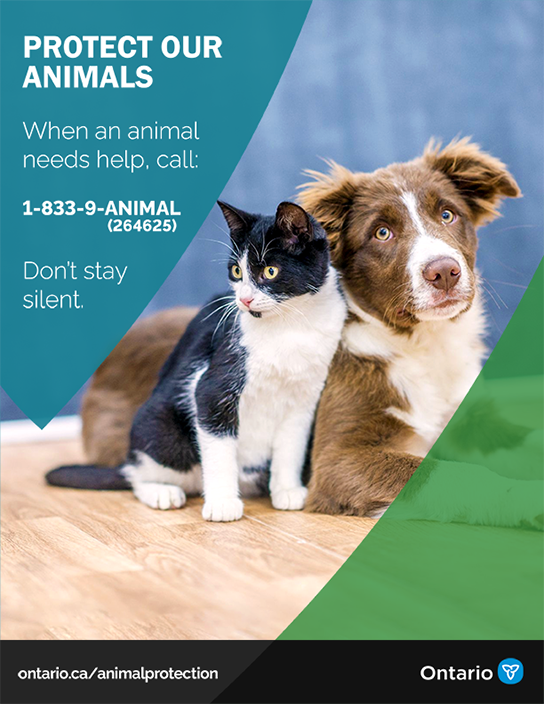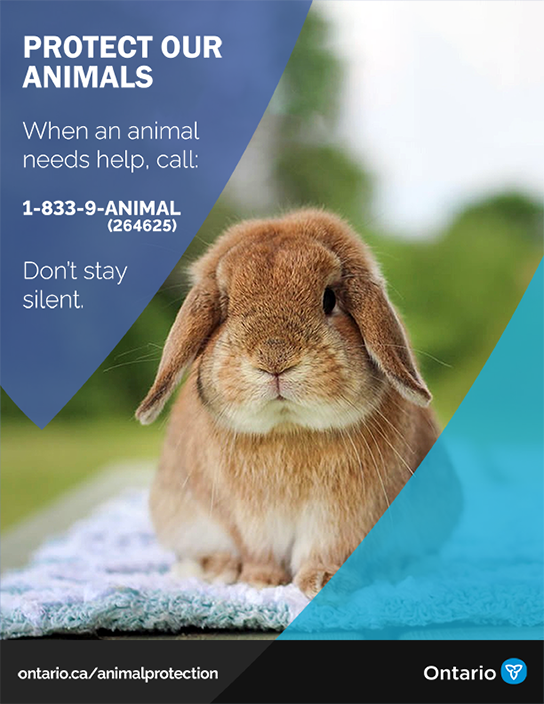Animal welfare
Abuse and neglect of any animal is not tolerated in Ontario. If you think an animal is in distress or is being abused, call 1-833-9-ANIMAL (264625)
Animal Welfare Services
Animal Welfare Services (AWS) within the Ministry of the Solicitor General is responsible for enforcing the Provincial Animal Welfare Services Act.
The chief animal welfare inspector and provincial animal welfare inspectors, including inspectors with specialized expertise in livestock, zoos, aquariums, and equines, provide enforcement across Ontario. They carry out inspections, respond to concerns, conduct investigations, as well as provide outreach and education on animal care best practices. Provincial inspectors also follow a standard code of conduct.
Calls made to AWS are received through the Ontario Animal Protection Call Centre (OAPCC) at 1-833-9-ANIMAL (264625), available 24 hours a day, seven days a week.
To ensure animals remain protected, provincial inspectors work, as appropriate, with:
- police officers
- First Nation officers
- veterinarians and registered veterinary technicians
- livestock and agribusiness stakeholders
- local humane societies, adoption agencies, rescue groups and Society for the Prevention of Cruelty to Animals (SPCAs)
- private boarding kennels and farms
- other ministries, such as the Ontario Ministry of Agriculture, Food and Agribusiness and the Ministry of Natural Resources
- the federal government, such as the Canadian Food Inspection Agency
Provincial inspectors follow a standard code of conduct and if they visit you on-site, they will:
- introduce themselves
- explain why they are attending on-site, such as for an inspection or for an investigation
Upon request, provincial inspectors will also provide identification.
Who to call
These contacts can be used if you are concerned about an animal in Ontario.
1-833-9-ANIMAL (264625) (Ontario Animal Protection Call Centre)
Call this number if an animal (for example, a pet, farm animal, or wild animal in captivity) is in distress or being neglected. This includes animals that:
- are injured, in pain, sick, suffering or abused
- lack proper care, water, food or shelter
The Ontario Animal Protection Call Centre offers TTY (teletypewriter) service for those individuals with a speech impairment or hearing disability.
Local animal control
Call your municipality or local animal control to report:
- wildlife that needs assistance, is injured or deceased
- wildlife or a domestic animal that is roaming on public property
- a dog attack (such as a bite) or an animal behaving in a way that poses a risk to the safety of people or other animals
- a pit bull (banned under the Dog Owners Liability Act)
- an animal-related noise complaint
911 (Emergency)
Call 911 in an emergency when any life is in immediate danger, such as:
- an animal attack resulting in serious injury to people or other animals that requires emergency medical attention
- a dog or cock fighting ring underway
- an act of animal cruelty underway, such as beating or torturing of an animal
- an animal left unattended in a hot or cold vehicle
Reporting animal abuse and neglect
To report an animal that is in distress, being abused or neglected, follow these steps:
- Call the Ontario Animal Protection Call Centre (1-833-9-ANIMAL (264625)) and provide a full address and as many details of the situation as possible.
- The Ontario Animal Protection Call Centre will file an incident ticket.
- Based on the location and nature of the incident, the call centre may flag the ticket for further investigation with the appropriate authorities, such as a provincial inspector or the local police.
- After the appropriate authority reviews the incident ticket, they may investigate on-site or involve other authorities as needed. The time it takes to investigate depends on the type of the complaint and the complexity of the inspection.
The Ontario Animal Protection Call Centre is unable to provide updates on calls or investigations. This protects the integrity of the enforcement work and allows inspectors to focus on the investigation. This also maintains the privacy of the individuals involved.
The authorities will only contact you if they need more information.
Privacy and confidentiality of calls
When you call the Ontario Animal Protection Call Centre, you will be advised that your caller ID and an audio recording will be kept for record-keeping and legal purposes. Anonymous calls are not accepted. Personal information is collected under the authority of the PAWS Act and will be kept confidential, but may be needed for inspections or investigations.
If you wish to obtain records, you can submit a freedom of information request.
Penalties
Ontario has the strongest provincial penalties in Canada for animal abuse and neglect. The Provincial Animal Welfare Services Act covers offences, including:
- causing or permitting distress to an animal
- causing harm or attempting to cause harm to a law enforcement or service animal
- promoting, arranging or receiving a financial benefit from animal fighting events
- training animals to fight other animals
- owning or possessing equipment or structures used in animal fighting
- failing to follow any applicable standards of care
- obstructing an inspector or agent
- operating a puppy mill
Violating these laws can result in sentences such as:
- up to two years in jail
- fines of up to $130,000 against an individual on a first offence, or up to $500,000 against a corporation on a first offence
- a lifetime ban on animal ownership
- other penalties
Individuals can also be charged with animal cruelty under the Criminal Code.
Our goal is to ensure that Ontario’s animals are always protected and treated in a humane manner.
Provincial Animal Welfare Services Act
The Provincial Animal Welfare Services Act (PAWS Act) came into force on January 1, 2020. The PAWS Act and its regulations help ensure that animals are protected and treated in a humane manner.
Protections include setting out basic standards of care that apply to all animals covered under the act, as well as specific standards of care that apply to animals in unique circumstances.
Basic standards of care that apply to all animals covered under the act include requirements for:
- adequate and appropriate food, water, medical attention and care
- ventilation, light and protection from the elements, including harmful temperatures
- sanitary conditions and space to enable natural movement and exercise
- pens or enclosed structures
- humane euthanasia to minimize pain and distress to animals
- transportation in a manner that ensures an animal’s physical safety and general welfare
In addition, the PAWS Act includes the Preventing Unethical Puppy Sales (PUPS) Act that helps to stop harmful dog breeding practices and imposes penalties for dog breeding operations, often known as puppy mills.
Animals in unique circumstances
Ontario has additional standards of care for:
- dogs kept and tethered outdoors
- marine mammals including:
- cetaceans (for example, whales, dolphins and porpoises)
- pinnipeds (for example, walruses and sea lions)
- sea otters
- wildlife in captivity
- primates in captivity
PAWS Act exceptions
Learn about exceptions in the PAWS Act around causing distress and standards of care, such as hunting wildlife.
Making an appeal
If you have concerns about a decision made by an animal welfare inspector related to your case, you can file an appeal to the Animal Care Review Board (ACRB). This applies if a provincial inspector:
- issued you an order
- removed your animal(s) under the PAWS Act
- issued you a decision that your removed animal(s) would be kept in the chief animal welfare inspector’s care
- issued a bill, called a statement of account, or bill, for costs associated with removing your animal(s), such as food, transportation, veterinary care or sheltering
The ACRB is an independent, quasi-judicial agency that resolves disputes and conducts hearings regarding animal welfare. They review and make decisions on appeals of orders and decisions made by the chief animal welfare inspector and other animal welfare inspectors.
Timelines
If you are filing an appeal, you must do so within 10 business days after being served with any of the following:
- an order
- a notice of animal removal
- a notice of decision to keep an animal in the chief animal welfare inspector’s care
- a statement of account
There is no fee to file an appeal with the ACRB. For more information, please visit the Animal Care Review Board’s website.
Making a complaint about a provincial inspector
Provincial inspectors are directly accountable to the chief animal welfare inspector, who is accountable to the Solicitor General of Ontario.
If you have a complaint about a provincial inspector’s conduct, please complete the complaint form.
Filing a complaint
If you have a complaint about a provincial inspector’s conduct and believe an inspector has broken the code of conduct, please complete the complaint form. Anonymous complaints will not be accepted.
After the online complaint form is submitted, an automatic acknowledgement will be generated and sent to the complainant.
Reviewing complaints
The chief animal welfare inspector reviews all complaints and determines if an investigation is appropriated.
When an investigation occurs, the chief animal welfare inspector may take action if the report confirms misconduct. Actions include:
- reprimand
- suspend the appointment of the respondent inspector until he or she has complied with certain conditions
- impose conditions
- end the appointment of the respondent inspector
The chief animal welfare inspector may refuse to investigate a complaint if:
- the event occurred over six months ago
- the complainant was not affected by the conduct of the person who is the subject of the complaint
- the complaint alleges conduct that does not constitute a failure to comply with the code of conduct
- the complaint is deemed frivolous, vexatious, or made in bad faith
AWS will provide the complainant with one of the following:
- a refusal letter with reasons for the refusal
- an acceptance letter informing the complainant that AWS will investigate their complaint
The chief animal welfare inspector will notify the complainant, the respondent inspector, and any other prescribed person of the measures in response to the finding of misconduct.
Withdrawals
If you want to withdraw your complaint, you must complete a complaint withdrawal form. Please contact animalwelfareservices@ontario.ca for a copy of this form.
Complaints about the chief animal welfare inspector
If you have a complaint about the conduct of the chief animal welfare inspector, you may write directly to the solicitor general. Any person can make a complaint in writing to the solicitor general about the conduct of the chief animal welfare inspector. You can send an email to minister.SOLGEN@ontario.ca.
Contact us
To send any general questions or comments about animal welfare or to request a hard copy of any document on this webpage, contact animalwelfareservices@ontario.ca
Important: Do not submit animal-related complaints or concerns to this email address. Please call 1-833-9-ANIMAL (264625) if you believe an animal is in distress or being neglected.
Related legislation
- Criminal Code (Department of Justice - Canada)
- Health of Animals Act (Department of Justice – Canada)
- Horse Racing Licence Act (Ministry of the Attorney General)
- Dog Owners’ Liability Act (Ministry of the Attorney General)
- Fish and Wildlife Conservation Act (Ministry of Natural Resources)
- Ontario’s agriculture and food laws (Ministry of Agriculture, Food and Agribusiness)
- Veterinarians Act (Ministry of Agriculture, Food and Agribusiness)
- Animals for Research Act (Ministry of Agriculture, Food and Agribusiness)
- Security from Trespass and Protecting Food Safety Act (Ministry of Agriculture, Food and Agribusiness)
Resources

Download PDF - Protect our Animals dog and cat poster (8.5x11 inches, 115 KB)
Download PDF - Protect our Animals dog and cat poster (11x17 inches, 603 KB)

Download PDF Protect our Animals rabbit poster (8.5x11 inches, 108 KB)
Download PDF Protect our Animals rabbit poster (11x17 inches, 624 KB)

Download PNG Protect our Animals dog banner image (104 KB)